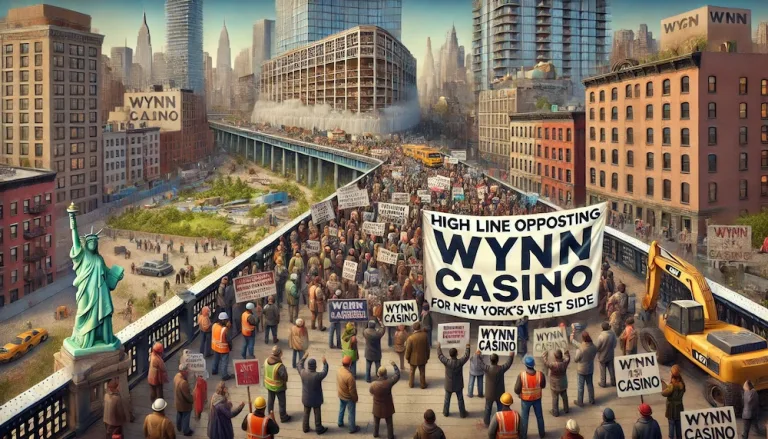The High Line, a nonprofit organization dedicated to preserving the park on the West Side of Manhattan, has launched a campaign against the proposed casino hotel by Related Cos. and Wynn Resorts. The group’s “Protect the High Line” campaign argues that the new development plan undermines a 2009 agreement with the city aimed at developing housing and safeguarding the Western Rail Yards.
The 2009 Agreement
In 2009, Related Cos. agreed with the city to develop the Hudson Yards area, promising to deliver between 3,454 and 5,700 housing units. The current proposal by Related and Wynn includes three towers: two zoned for commercial use and one for residential use with just over 1,500 units. One of these towers, spanning three million square feet, would feature the Wynn name.
The High Line asserts that the developers are seeking to revise the original zoning agreement, potentially reducing the number of residential units while increasing the height and bulk of the buildings, which would obstruct views from the park.
The Campaign’s Stance
The High Line’s opposition is rooted in the belief that both scenarios presented by Related — with or without the casino — are flawed. Even without the casino, the group fears that the development will not meet the original housing commitments and will create larger skyscrapers than initially planned.
“If the casino is approved, it would be located at the north end of the property and would be part of a broader $12 billion commitment by Related. It’s expected the gaming venue could command 2.7 million square feet, making it bigger than Wynn Las Vegas,” stated the High Line. However, the group emphasizes that they are not against development per se, but want to ensure it aligns with the community’s interests and improves upon the 2009 agreement.
Community and Regulatory Challenges
The opposition from the High Line is not isolated. Manhattan Community Board 4 (MCB4) has also raised concerns about the proposed plans, particularly criticizing the “dramatic” reduction in residential units. Additionally, the proposed rezoning and the potential casino component are subject to multiple levels of public review and regulatory approvals, including the City’s Uniform Land Use Review Process and the State Gaming Commission’s competitive licensing process.
Alan van Capelle, executive director of Friends of the High Line, emphasized the importance of community involvement, saying, “We have expressed our concerns directly to Related and feel it is critical to broaden the conversation to include all relevant stakeholders and our community so we can all move forward together with a better plan.”
Broader Context of Casino Opposition
The opposition to the Wynn New York casino is part of a larger trend of resistance against proposed downstate casinos in New York. From Times Square to Queens and Nassau County, various proposed casino sites face significant community and political hurdles.
The High Line’s formal opposition marks a significant challenge for Wynn and Related. The community’s concerns, coupled with the lengthy and complex approval processes, suggest that the future of the proposed development is far from certain. As the debate continues, the fate of the Western Rail Yards and the impact on the High Line will remain a focal point for community advocates and developers alike.
Conclusion
The High Line’s opposition to the Wynn New York casino project highlights the complexities and community concerns surrounding urban development projects. As stakeholders continue to voice their opinions, the final decision will significantly impact Manhattan’s West Side’s landscape and community. The ongoing discussions and regulatory reviews will determine whether the project proceeds and how it aligns with the original vision for the Hudson Yards area.

David Harrison stands tall in gambling journalism, marrying his firsthand casino experiences with a deep understanding of betting psychology. His articles transform complex gambling jargon into engaging tales of strategy and chance, making the world of betting accessible and enjoyable. David’s knack for narrative extends beyond print, making him a sought-after speaker on gambling trends and future bets. In the realm of gambling, David is both a scholar and a storyteller, captivating readers and listeners alike.


